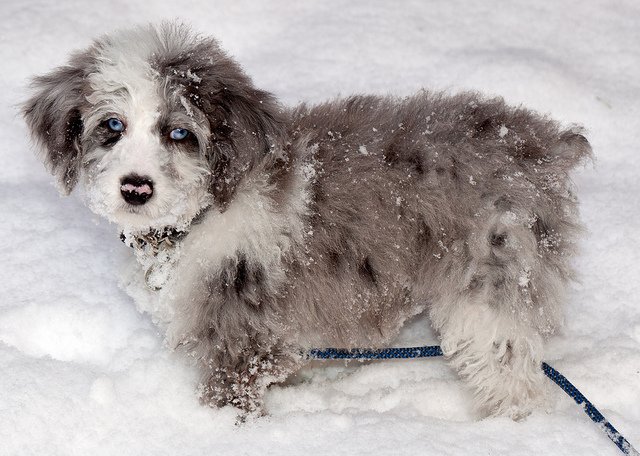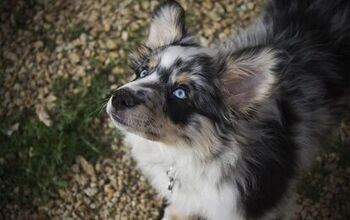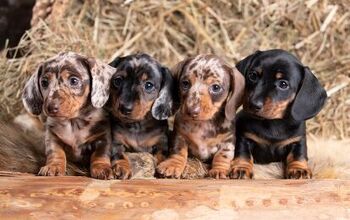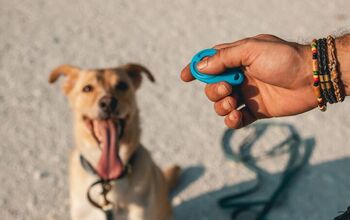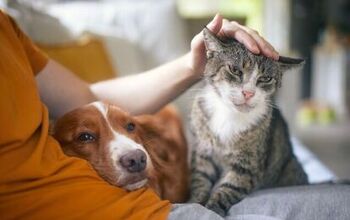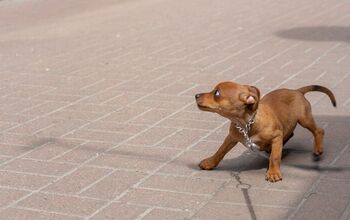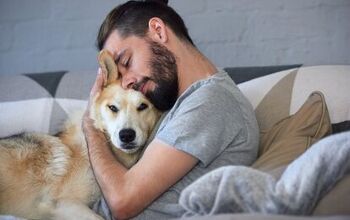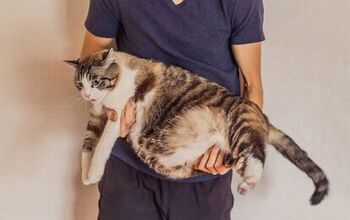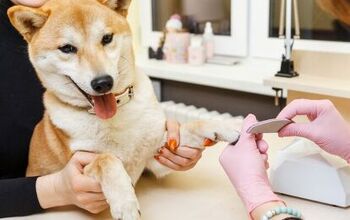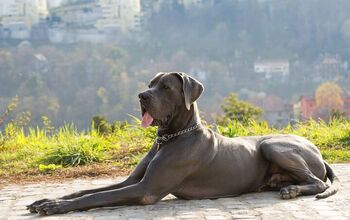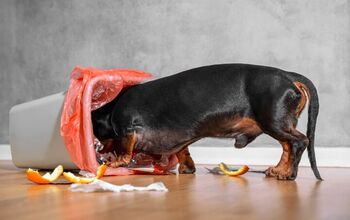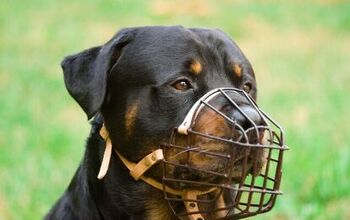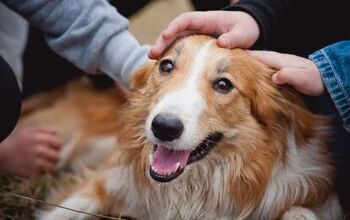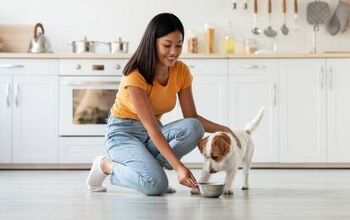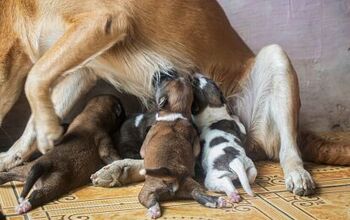Aussiedoodle


About Aussiedoodle
Aussiedoodle Basics
The Aussiedoodle might have a name so absurd that it sounds like a joke, but this is very much a real breed of dog. More than that, it’s one of the most adorable puppers that you’ll ever be lucky enough to lay your pretty little eyes on. The Aussiedoodle is a medium sized, extremely fluffy, and almost unfairly cute breed of designer dog. It was created by crossing an Australian Shepherd with a Standard Poodle. Like most designer dogs created from a pair of purebreds, the Aussiedoodle’s physical characteristics can sometimes vary. But in general, they are a medium sized dog with a slim, yet surprisingly strong body. Their coats may vary in color, but they are always curly and sweetly soft to the touch. Just try not to fall in love with one of these things. Is practically impossible, regardless of silly their name might sound.
Aussiedoodles, like both of their parents, are extremely intelligent and trainable animals. They are also eager to please and love having a job to do (whether it is playing catch or competing in agility). They are an excellent choice for intermediate dog owners that are able to keep up with their energy levels. These dogs will keep you active and entertained, so only consider bringing one of these beauties home if you can keep up with them.
The Aussiedoodle is a medium sized, extremely fluffy and almost indecently cute breed of designer dog created by crossing an Australian Shepherd and a Standard Poodle.
Origin
The Aussiedoodle is a relatively new breed of designer dog that is in high demand amongst doggo lovers and cuteness enthusiasts. And it’s really not that surprising considering the many qualities of the parental breeds involved in this little beauty. Both the Australian Shepherd and the Poodle are remarkably smart dogs with sweet and playful nature, which obviously makes them fantastic companions. However, even with their ever-growing popularity, there is not much we know about these crossbreeds just yet.
Some Doodle mixes, such as the Bernedoodle or the Labradoodle, have a well-documented origin story, but when it comes to the Aussiedoodle, there is no such luck. The reasons for creating a mix of these two breeds might be clear, but the nitty gritty of the process certainly isn’t. The best guess that anyone has is that the Aussiedoodle shares his history with the majority of other designer dogs. That means that they were first born sometime in the last 20 years, somewhere in the United States. Not a lot of help, I know. Unfortunately, that’s the best that can be done with doggos like these, no matter how cute they are!
Pedigree
Aussiedoodles are created by crossing a purebred Poodle with a purebred Australian Shepherd. When crossing these dogs, the bitch is usually the Australian Shepherd as a Poodle carrying a litter by an Australian Shepherd male might have health concerns due to the size of the puppies. It’s important to be careful with these sorts of things.
Despite the fact that the Aussiedoodle has noble ancestors, these pups are still not recognized by the American Kennel Club or any of its international counterparts. Since major canine clubs don’t consider this lovely dog to be a purebred, they are not eligible for registration. So sadly, you won’t be getting any official pedigree papers for this pup. On the other hand, a reputable breeder would allow you to meet the parents and see for yourself what their behavior and appearance are like. So, at least it’s possible to know what to expect from your puppy that way. Additionally, you might also take a look at those pedigree papers (both a Poodle and the Australian Shepherd parent should have them) as a proof of good breeding and exemplary lineage. Sure, that’s not ideal, but at least it’s something.
Avoid dubious breeders, pet stores, and puppy mills that sell Aussiedoodle puppies. In most cases, these dogs are not only badly mistreated, but also sick and ridden with congenital issues. It’s truly sad what some dog owners will do to make a buck and not fair to anyone involved in the transaction.
Food / Diet
A healthy and hearty diet will give your Aussiedoodle the energy and fuel they need to thrive. There are a lot of options available when it comes to canine nutrition. This can range from raw food to cooking your dog homemade meals, but the safest option is to feed them high-quality dry dog food. Kibble is formulated to offer all of the important nutrients in the right ratio. This will give your pet everything that they need to be healthy and grow strong. The only “trick” is to find the perfect type of kibble for an Aussiedoodle. This hybrid breed is active and athletic. So, their choice of food should reflect that. In general, dry food for active large dogs is a good fit for most Aussiedoodles. Additionally, you should pick out food that appropriate for your dog’s age. Much like humans, puppies, seniors, and adult dogs don’t all have the same nutritional needs. You wouldn’t feed your grandfather baby food and your doggo’s diet deserves the same level of respect.
While an Aussiedoodle definitely needs more kibble in his bowls than, say, a Chihuahua, it doesn’t mean you should let them overeat. Weight gain can lead to serious health issues in canines. This can be as simple joint issues or as serious as something like diabetes and heart problems. Stick to manufacturer recommendations on serving sizes and split the daily dose of your dog’s food into two meals to avoid any potential issues with overfeading your pup.
Aussiedoodles are extremely affectionate and devoted towards their owners and should never be raised outdoors or in kennels.
Training
It goes without saying that every dog should go through basic training and socialization, to make sure that they are well behaved and get along with other pets, strangers, and children. Aussiedoodle are no different, and thankfully, they are easy to train even if you are not as experienced! Like Poodles and Australian Shepherds, Aussiedoodles are extremely intelligent animals, if not more so. This makes training them an absolute pleasure. These pups are eager to please and quick to pick up on any lesson that you throw their way. They do best when trained with reward-based methods and tend to respond quite poorly to harsh training techniques.
However, even though you shouldn’t yell or be harsh to your dog during the training process, you need to be assertive and establish a role of authority. Precisely because they are so smart, Aussiedoodles can be quite mischievous and stubborn, so if they see an opportunity to become the alpha of the relationship and get their way, they’ll seize it.
Overall, relying on positive reinforcement methods while maintaining a loving but firm hand is a fairly simple and sustainable means of turning your rambunctious little pup into the well-behaved and fully grown doggo of your dreams!
Weight
The average weight of a hybrid breed is usually estimated as the average weight of its two parents. Aussiedoodles can weigh anywhere between 25 to 70 pounds. Sure, that’s quite a wide range and it may sound unpredictable. However, the best way to predict your doggo’s full size is by seeing the size of their parents. It’s not a perfect science, but at least better than nothing. Poodles come in three sizes – toy, miniature, and standard size, and while it’s miniature poodle that is most often crossbred with Australian Shepherd, other combinations might be possible, which will impact the weight and size of their offspring. Standard poodles weigh from 40 to 70 pounds, miniature poodles are between 10 and 15 pounds, and toy poodles weigh 5 pounds or less. It’s easy to see why there would be significant variations in a crossbreed litter spending on the size of the Poodle parent!
Keep in mind that the adult size of a mix-breed puppy cannot be accurately predicted or guaranteed, even when you know their parents. Sometimes, puppies from the same litter can grow up to different sizes. Thus, variations in the sizes of Aussiedoodles can be more common than you would think!
Temperament / Behavior
A hybrid dog’s temperament can often differ greatly based on the specific genetic contribution of each parent. However, when it comes to Aussiedoodles, they are generally regarded as extremely intelligent, playful, and loving dogs. Those traits are quite common in both of their Poodle and Australian Shepherd parents – it’s not like their parental breeds are completely different from one another, so there’s not that much room for wildly different characters. Getting an Aussiedoodle is somewhat of a safe bet, considering their genetics. These pups practically specialize in being lovable.
Aussiedoodles are extremely affectionate and devoted towards their owners. They should never be raised outdoors or in kennels since they require constant human interaction and affection to maintain a happy and balanced life. They form strong bonds with their people, and are a wonderful choice for a family pet, as they can get along great with children and thrive when surrounded by humans that provide care and attention – in a big family, there’s almost always someone around to cuddle with the pooch.
However, while they do tend to love children, Aussidedoodles should still be supervised around very young children as they might accidentally hurt them due to their high energy levels. These are rambunctious little pups after all, so sometimes they can get a little out of control as youngsters and accidentally knock down a small kid during play.
It’s also important not to neglect their training and socialization if you want them to reach their full potential – as with all dogs, it is important that the Aussiedoodle’s owners provide it with rules, boundaries, and limitations as well as consistent leadership to ensure a well-behaved and balanced dog. Sure, some dog breeds might be genetically predisposed to good behaviour, but without proper training it’s impossible to guarantee that they will grow into their best selves.
Another interesting thing about the Aussiedoodle’s temperament is that these dogs sometimes retain the herding instincts of the Australian Shepherd, trying to round up other pets or kids like their ancestors would do with sheep. However, these instincts should be kept in check and corrected from a very early age as they can lead to issues down the road. This is yet another reason why early training and socialization are so extremely important in the upbringing of Aussiedoodles – it will make sure that your mischievous puppy grows into a lovely adult dog with an adaptable personality.
Common Health Problems
A lot of people believe that purebred crosses are the healthiest type of dog, but the truth is much more complicated than that. Sure, hybrids can be much more resilient and healthier than their purebred parents, but their mixed breed origin is not necessarily a guarantee of absolute health. All dogs can inherit issues from their parents or be prone to a set of problems common for their family tree. That means that hybrid dogs have two sets of breed-specific issues to worry about. It’s not something that should scare you off owning a hybrid, but certainly something worth keeping in mind as you pick out a new pup, as their lineage will play a big role in their overall health. Designer dogs from puppy mills and irresponsible breeders are much more likelier to have diseases, both from those that are the result of poor conditions they were born into and those of congenital nature, due to improper breeding – a good way to improve the odds of your pet having good health to begin with is to go for a reputable breeder that will put in the effort into bringing healthy puppies into the world.
Even so, despite the fact that so much depends on “genetic lottery”, the Aussiedoodle is a generally healthy dog. Good breeding will minimize the risk of inherited issues, but they can still be prone to problems such as Cushing’s Disease, hip dysplasia, progressive retinal atrophy or overt sensitivity to ivermectin. No dog is guaranteed to live a life of perfect health and the Aussiedoodle is no exception.
Life Expectancy
An Aussiedoodle that is well cared for will often enjoy a lifespan of up to 12 years. Obviously, there is no way to guarantee a specific lifespan in any dog, but that’s a good guess. This is a generally a common lifespan for most breeds, provided that their needs are met throughout their life. As such, an Aussiedoodle can be a great choice for a dear four-legged friend that will be by your side for more than a decade. While this does not mean a lifelong companion, it still constitutes a good chunk of your life journey. A journey made better thanks to your doggo friend!
Exercise Requirements
Aussiedoodles have a relatively high level of energy and should be provided with an outlet to drain away this excess energy every day. An hourly walk or jog will often do splendidly as these dogs love following their human companions wherever they go. Although not a working breed, Aussiedoodles are extremely intelligent and do require mentally stimulating and challenging tasks to which they can apply themselves to. So, if you aren’t an active dog owner who can dedicate plenty of time to stimulating their dog every day, then perhaps this isn’t the best breed for you. You need to make sure they get regular walks and some solid runs in the park. Aussiedoodles can thrive the most in a household with a nice fenced-in yard. That way, these dogs can enjoy all the fun and exercise they require, without having to leave the home.
Aussiedoodles are extremely loving towards children and make excellent family pets.
AKC
As with any other designer dog breeds, the Aussiedoodle is not recognized by the American Kennel Club. Fortunately, they are recognized by the American Canine Hybrid Club, the American Canine Hybrid Club, the Designer Dogs Kennel Club, the International Designer Canine Registry and the Designer Breed Registry.
Coat
The level of grooming that an Aussiedoodle requires will vary depending on how curly its coat is. Dogs that have a wavier coat often only require combing once or twice a week, whereas dogs with a curlier coat need to be groomed more often. So, you’ll have to wait and see how your Aussiedoodle’s coat grows in before you’ll be able to know how much grooming is required.
Puppies
As with all dogs, Aussiedoodle puppies should be socialized with humans and other animals from a very early age. This is particularly important because they are a very curious breed of dog. So, don’t keep this dog to yourself if you want your pup to grow up into a well-balanced doggo. Fortunately, Aussiedoodles are so cute that people will be running up to socialize with them in the street anyways. It’ll be hard for you to keep your Aussiedoodle away from other people and with a dog this adorable, it would be a shame to keep them away from the public anyways. This early socializing is important for later life. Your dog will be more comfortable around strangers, and other dogs too. For an inquisitive Aussiedoodle, this can mean a lot, and remove the possibility of aggression issues such as lashing out and growling due to fear. Proper socializing means a lot!
Aussiedoodle Frequently Asked Questions
Do Aussiedoodles bark alot?
Aussiedoodle dogs are considered to be low barkers and are pretty much quiet when compared to some other breeds. Of course, a lot will depend on the individual dog’s character, but unless there’s a reason for it, this designer dog won’t be barking its head off. As usually with all dogs, some extraordinary situations might cause excessive barking. This is especially noticeable in dogs that aren’t properly trained or cared for, or dogs that suffer from separation anxiety. For example, if you leave your dog cooped up inside for hours on end – all on their own – fear and anxiety might set in. In such cases, tons of barking can become a vent and a defense mechanism. This can happen to all dogs, and Aussiedoodles are no exception.
How much does an Aussiedoodle cost?
The price for an Aussiedoodle puppy varies depending on its pedigree, and can range between $1,500 and $5,000. The most realistic price is somewhere in the middle, for a healthy puppy from a reputable and responsible breeder. Aussiedoodles puppies that have a coat in exotic coloring, such as Blue Merle Phantom or Red Blonde Bicolor or are mini in size will cost more than the standard size and coloring. Creating an Aussiedoodle that will cater to all the breed standards can be a difficult process for breeders. If we take into account the unpredictable nature of the breed, and the fact that a breeder can be suprised by the final look of the puppies, we can begin to understand the somewhat steep price.
Are Aussiedoodles aggressive?
Not only that Aussiedoodles are not aggressive, they are considered to be true cuddle bugs and loving companions. When trained and socialized properly, these dogs will grow to be friendly, affectionate, and get along great with everyone around them. Not a mean bone in their body! Affectionate, loving, and caring, these dogs are ideal for a family environment, and can establish lasting and strong bonds with their owners. It shouldn’t come as a surprise to know that Aussiedoodles are great around children, and other dogs, too – when they are socialized and properly trained. All in all, these are some of the friendliest doggos around!
Are Aussiedoodles hypoallergenic?
All “doodle” designed dogs are created to produce new breeds with the hypoallergenic coat traits of the Poodle which is their common parent breed. Aussiedoodle is no different, so the breed can be suited for people with mild or moderate dog allergies. These dogs shed a little hair or not at all, and do not shed much dander, both of which are known allergens. Their fur is soft but not fluffy, and requires little to moderate care. An occasional grooming and brushing will get rid of all excess hair in no time.
Are Aussiedoodle tails docked?
Some breeders dock the tails of their puppies, but this is not a required practice. It all depends on preferences, as there are pros and cons for both docking and leaving the tail intact. Most pet parents that want an Aussiedoodle as a family dog and not a working dog, though, opt for not docking their pet’s tail. Of course, the natural and ethical procedure would be to leave the tail intact. It’s there for a purpose and certainly serves a natural role in your dog’s life. What is more, the visual differences are minor – some breeders prefer docking due to simple aesthetics, which are often overhyped.
Photo credit: Mike Lawson/Flickr

Amy Tokic, Editor of PetGuide.com, is a passionate animal lover and proud pet parent of Oscar, a Shih Tzu/Chihuahua cross, and Zed, a Japanese Chin. Her love of animals began in kindergarten, when she brought her stuffed dog Snoopy into class with her every day. Now, she writes about her adventures in pet ownership and tirelessly researches products, news and health related issues she can share with other animal enthusiasts. In her free time, Amy loves perusing used book and record stores, obsessing over the latest pet products available and chasing squirrels with wild abandon (a habit attributed to spending too much time with her pooches).
More by Amy Tokic



